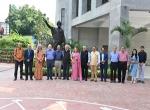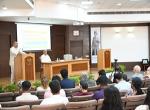In the first-ever visit by any official delegation of Democratic Progressive Party (DPP) of Taiwan to India, a five-member delegation led by DPP Member of Parliament MP Ms. Chen, Chiech-Ju and Ms Huai-Hui Hsieh, Deputy Director, Department of International Affairs DPP, Dr I-Chung Lai, Director of Foreign Policy Studies (Taiwan Think Tank), among others, visited Vivekananda International Foundation (VIF) on August 11, 2011 for an interaction on regional security dynamics.The VIF’s battery of scholars which engaged the Taiwanese delegation included among others Mr Ajit Doval, KC, Director VIF, Amb TCA Rangachari, Lt Gen RK Sawhney, Brig Vinod Anand, and Mr. A. Suryaprakash, a noted journalist.
The interaction focussed on finding further avenues of cooperation between India and Taiwan. In his welcome note, Mr. Ajit Doval, KC, Director VIF, lauded the role of DPP in the political sphere of Taiwan and said that values practiced by the party found resonance with the Constitution of India. He particularly emphasised Taiwan’s independent status. Presenting his perspective on security challenges facing the democratic countries in this region, Mr. Doval underlined the challenges posed by China’s growing military capabilities, especially in the areas of high technology, including cyber warfare as well as the acquired capabilities of the Chinese military to project power into outer space. While Mr. Doval underscored the need for a constructive engagement with China, he also flagged the need for a much broader interaction among the think tanks in these countries which share common perceptions of security, specifically with a view to undertake a more focussed study of China. Pointing to a critical gap in the study of China, Mr. Doval suggested that Taiwan could come forward in setting up of Chinese language study centers in India.
Concurring with Mr. Doval’s views on potential challenges from China, Ms Chen said, democratic countries in the region including India, Taiwan, South Korea, Japan, and Singapore, especially countries of ASEAN, among others, need to form a common ground against common challenges. She however said if a country poses military threats to another country, it is an uncivil way. She observed that a country should not be judged on the basis of how much military power it has, but on the basis of how much it has accomplished for its own people. Responding to a suggestion made by VIF’s Director that new economic realities have brought China and Taiwan closer to one another, Dr I-Chung Lai said that a vast majority of Taiwanese (80-90 percent) are still against unification with the mainland China; the increased economic interaction with China does not reflect any change with regard to Taiwanese people’s choice about the future of Taiwan or their own national identity. The perception of threat from China still persists in Taiwan, insisted Dr I-Chung Lai. For some sections of the business community in Taiwan, China is no longer their favourite destination for investment that it used to be, especially because of high inflation rate, labour unrest, higher wages, frequent policy changes, administrative restrictions, corruption, and so on. In response to another pointed question put by the Director about the long term economic prospects of China, Dr I-Chung Lai suggested that China’s economic growth in the long term could be adversely affected due to various factors including growing economic disparities, social unrest, demographic pressures, and high inflationary trends among others. Maintaining social stability however will remain the biggest challenge for policy makers in China for any foreseeable future, concluded Dr I-Chung Lai.
The interaction however focussed a great deal on China’s expanding maritime ambitions which are increasingly seeping into the waters of Indian Ocean. The Taiwanese delegation maintained that Beijing’s increasing attempts to expand its areas of core interests are in consonance with its desire to secure energy interests from East Asia to the Indian Ocean. Both sides agreed that China’s growing forays into the Indian Ocean have the potential to further destablise the region. Mr. Doval however flagged his concern about the lack of sincerity on the part of China to resolve its border dispute with India, especially in view of the fact that Beijing has resolved its land border disputes with almost every other neighnour except India. Despite India making her best efforts to engage China in the most constructive manner, the peace dividend for India still remains elusive.
Elaborating India’s core interest vis-à-vis China, Amb Rangachari said that India favours good and friendly relationship with China but this can not be achieved with one militarily dominant power unilaterally dictating the terms of relationship. He maintained that India’s border with China has been relatively peaceful compared to India’s border with Pakistan. The former ambassador however pointed to China’s ‘nibbling acts’ on India’s borders. The low level military exchanges between China and India do not go very far as these are being conducted at relatively low level and have very limited objectives. There is however a need for regular contacts between the two militaries, especially at the level of commanders, stressed the ambassador. Speaking of bilateral economic ties between Asia’s two major economies, Ambassador Rangachari said that India’s growing trade deficit with China is unsustainable in the long term, especially because it has the potential to negatively impact the economic relationship. He also flagged India’s concern vis-à-vis China’s continued military and nuclear support to Pakistan, a core irritant in bilateral ties. Amb Rangachari however opined that India welcomes China maintaining good relationship with India’s close neighbours, provided it does not impinge on India’s security. On the question of China’s massive investment in foreign countries, especially in US and Europe, Ambassador Rangachari said that it reflects poor wisdom on the part of Chinese, especially in light of the fact that Chinese themselves need this money for their own developmental requirements. China’s investment in Europe and America however has reduced these countries’ maneuverability vis-à-vis China.
The session also witnessed some thoughtful insights injected by Lt Gen RK Sawhney who drew a number of comparisons between China and Taiwan. He reiterated the views of Ambassador Rangachari that India is inclined to peaceful co-existence with China despite all the differences. Outlining her party’s foreign policy priorities, Ms Huai-Hui Hsieh said that DPP favours taking a balanced approach towards Taiwan’s relationship with the mainland which entails improved relationship with democratic countries of this region without provoking China. The interaction concluded with both sides agreeing on the need for regular exchanges of this nature on a continuing basis.





